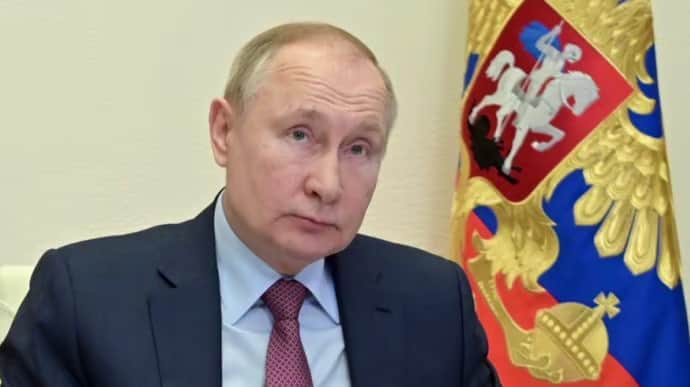Putin not sure he can rally Russian elite – ISW

The Institute for the Study of War (ISW) has noted that the situation with the Wagner Group rebellion and the Kremlin's inability to respond promptly to it both indicate Russian dictator Vladimir Putin's lack of confidence in his ability to rally the Russian elite. Source: ISW Details: The Washington Post reported on 25 July that Ukrainian and European security forces said Putin did not issue orders for the most part of 24 June, despite warnings from Russian intelligence agencies 2-3 days prior of a possible rebellion uprising.
Reports said Putin and the Kremlin did not respond promptly to the 24 June Wagner Group rebellion, leaving it up to local Russian officials to make decisions about the so-called Private Military Company's (PMC) march on Moscow.
Advertisement:Experts concluded that the lack of reaction from the Kremlin and Putin in this case indicates that the Russian security apparatus was probably not ready for a direct challenge to the Russian military leadership and probably could not end the rebellion quickly. The Kremlin likely realises that its paralysis [inability to react - ed.] has shown the extent of the regime's instability, and appears to be consolidating Russia's internal security apparatus in the Russian National Guard to prepare for further domestic threats and show resolve. The report said, in addition, that Putin's inability to act quickly also shows that he is not confident in his ability to rally the so-called Russian elite around him, and may indicate how factional internal Kremlin politics have become.
Ukrainska Pravda is on Threads now
Russian President Vladimir Putin continued to express concern about potential threats from Wagner PMC and its founder Yevgeny Prigozhin during Belarusian President Alexander Lukashenko's extended visit to St Petersburg.
The ISW said Putin's decision to prolong the meeting with Lukashenko probably indicates that the Russian dictator is still worried about Wagner mercenaries, and it seems that Lukashenko could not reassure him. ISW also said Lukashenko probably wants to use his power over Wagner PMC to obtain concessions from Putin. In particular, Lukashenko tried to use Putin's concerns throughout the visit to Russia to achieve favourable terms in Belarusian-Russian relations, while rejecting Putin's demands for closer integration into the Union State and support for Russia's war in Ukraine.
In addition, the ISW also draws attention to the fact that the leadership is trying to reduce the security vacuum created after the Wagner Group's departure by creating formalised, but decentralised (regional) military "enterprises" based on the federation's subjects. The Russian State Duma adopted on 25 July in the second and third readings amendments to the federal law regulating weapons circulation, allowing the Russian subjects' heads to create specialised state unitary enterprises. The ISW noted the amendments would allow Putin to set up state enterprises on a temporary basis and then close them, after which those enterprises would have to hand over all small arms and other weapons to the Russian Defence Ministry within one month.
The Kremlin is probably trying to balance two competing security demands, including the need for combat-ready formations to fulfil the functions left by the Wagner Group after its armed rebellion and redeployment to Belarus, and the desire not to create systemic threats to the Russian state that Wagner Group's independence has generated. Regarding the situation on the front, the ISW indicated Ukrainian troops continued counteroffensive actions on at least three areas of the front line and made some advances on 25 July. The ISW assesses that Ukrainian counteroffensive operations are aiming to create an asymmetric casualty gradient that preserves Ukrainian manpower at the cost of conquering territories more slowly, while Russian manpower and equipment are gradually depleted.
To quote the ISW's Key Takeaways on 25 July:
- Russian President Vladimir Putin continued to manifest concern over potential threats that the Wagner Group and its financier Yevgeny Prigozhin may pose during an impromptu two-day extension of Belarusian President Alexander Lukashenko's visit to St.
Petersburg.
Lukashenko likely seeks to leverage his power over the Wagner Group to gain concessions from Putin.
- Russian leadership is attempting to mitigate the security vacuum left by the Wagner Group's departure by creating formalised but decentralised military "enterprises" on the basis of federal subjects (regions).
- Ukrainian forces continued counteroffensive operations on at least three sectors of the front and advanced on July 25.
- Russian forces conducted another series of Shahed drone strikes on rear areas of Ukraine overnight on July 24-25.
- The Angry Patriots Club continues efforts to cast former Russian officer and ardent nationalist Igor Girkin (Strelkov) as an opposition figure and may be attempting to appeal to Russian President Vladimir Putin through rhetoric about the illegality of Girkin's arrest.
- Putin and the Kremlin reportedly failed to respond promptly to the Wagner Group's June 24 rebellion, leaving local Russian officials to make decisions concerning the group's drive on Moscow.
- Russian forces conducted offensive operations near Svatove, Kreminna, the Bakhmut area, the Avdiivka-Donetsk City area, and the Zaporizhia-Donetsk Oblast border area and made claimed advances near Svatove, Kreminna, and Bakhmut.
- Ukrainian forces conducted offensive operations near Kreminna, the Bakhmut area, the Avdiivka-Donetsk City area, along the administrative border between Zaporizhia and Donetsk oblasts, and western Zaporizhia Oblast and advanced in the Bakhmut area, in some areas along the administrative border between Zaporizhia and Donetsk oblasts, and west of Orikhiv.
- US intelligence officials warned on July 25 that Russia's drone supply will dramatically increase as a result of continued bilateral Russo-Iranian cooperation.
- Russian officials continue efforts to deconflict legal discrepancies as part of the incorporation of occupied territories.
Journalists fight on their own frontline. Support Ukrainska Pravda or become our patron!